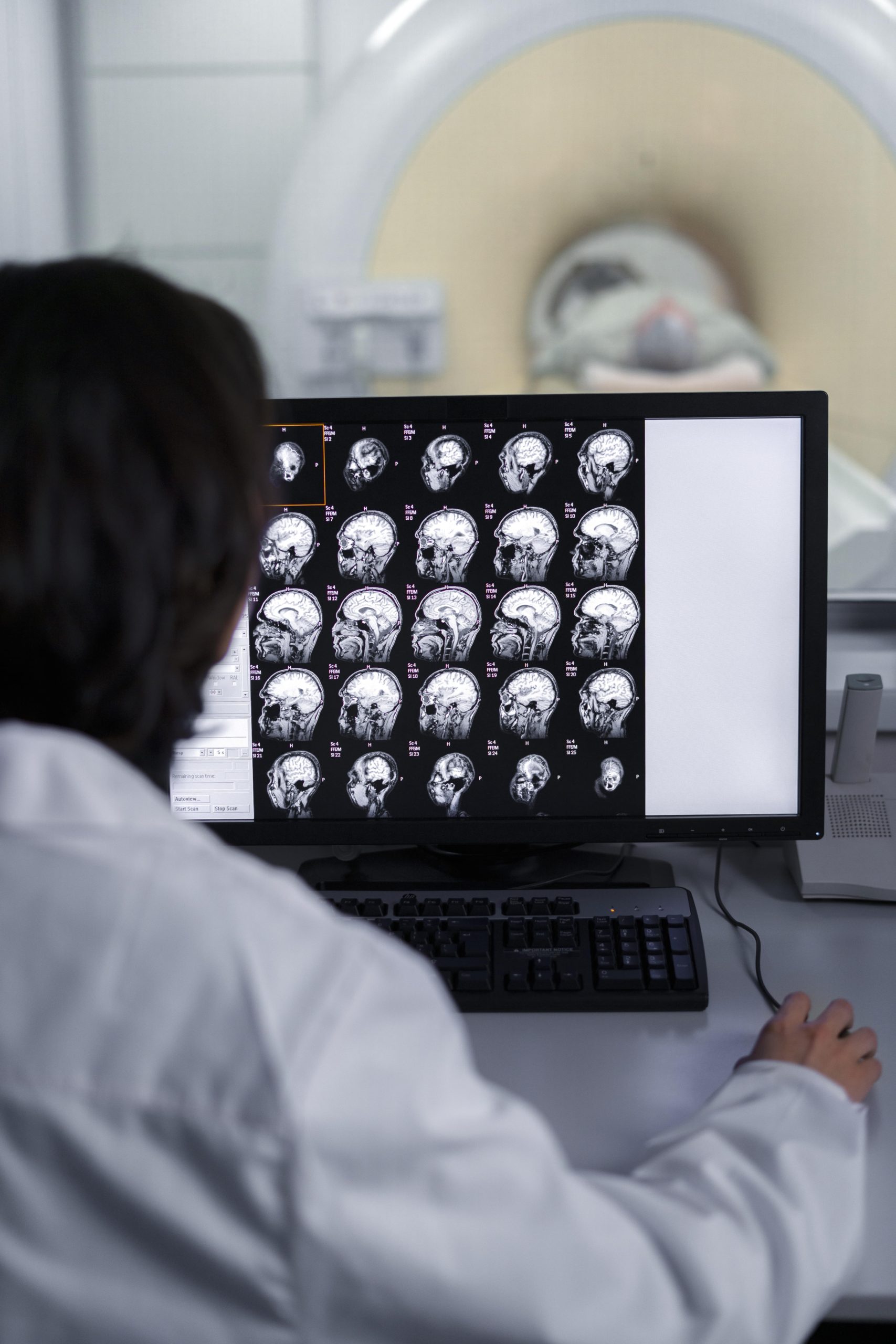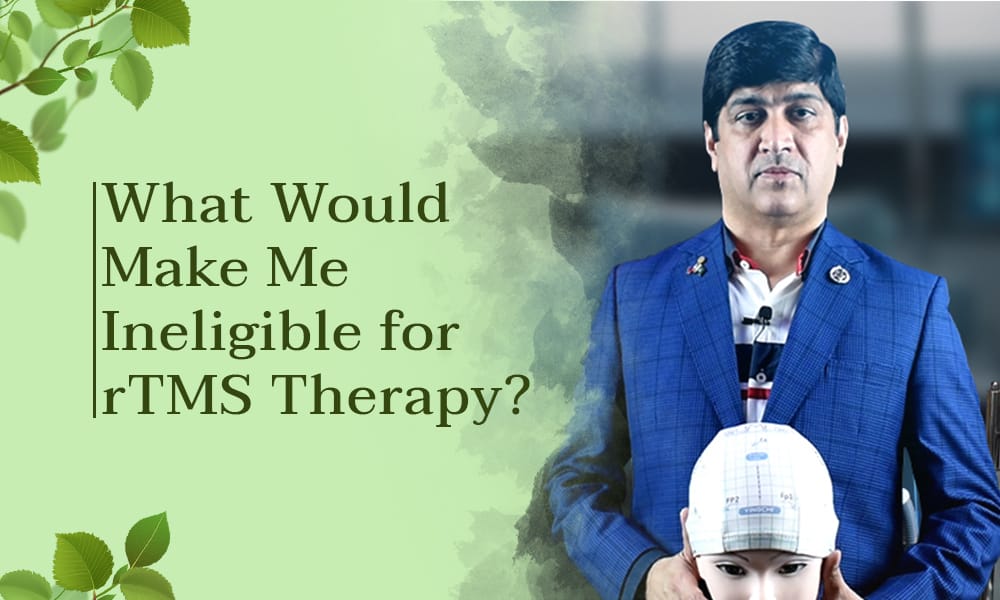- Jofa Tower 5th floor, SB-23, Block 13 C, Main University Rd, Gulshan-e-Iqbal, Karachi.
- +92 322 3746726
- tis@transformation.com.pk
What Would Make Me Ineligible for rTMS Therapy?

Repetitive Transcranial Magnetic Stimulation
August 1, 2023
What is Repetitive Transcranial Magnetic Stimulation?
August 2, 2023Transcranial Magnetic Stimulation (TMS) is a non-invasive medical therapy that stimulates particular parts of the brain with magnetic fields. It is mostly used to treat mental illnesses, especially major depressive disorder (MDD). Repetitive Transcranial Magnetic Stimulation (rTMS) is a type of TMS in which repeated pulses are administered to the brain over some time. While rTMS is considered safe and well-tolerated for many individuals, below is a list of metal implants that can prevent a patient from receiving rTMS:
- Clips or coils for aneurysms
- Stents placed in the neck or brain
- Implanted stimulators
- Brain activity may be monitored using electrodes.
- Implants of metal in your ears and eyes
- Shrapnel or bullet fragments in or near the head
- Facial tattoos with metallic or magnetic-sensitive ink
- Other metal implants or objects in or near the skull

Presence of Metal :
Metal implants or devices in or near the head, such as aneurysm clips, cochlear implants, deep brain stimulators, or pacemakers, may represent a risk during rTMS. These devices might be affected by or even harmed by the magnetic fields used in TMS.
Active Substance Use Disorder:
People who have a current substance use problem, such as drug or alcohol addiction, may not be considered suitable candidates for rTMS until they have completed effective addiction treatment.
Brain Injury or Neurological Conditions in the Past:
Individuals having a history of certain neurological diseases or brain traumas may be ineligible for rTMS due to possible problems or uncertainty about the effects of stimulation.
Medical Conditions That Are Uncontrollable:
rTMS may not be indicated if you have uncontrolled medical disorders, particularly those affecting the heart or neurological system.
Seizures or Epilepsy in the Past:
Individuals with a history of seizures or epilepsy may not be appropriate candidates for rTMS since the treatment uses magnetic pulses, which can potentially trigger seizures in susceptible individuals.
Pregnancy:
The safety of rTMS during pregnancy has not been extensively studied, and as a precaution, it is generally avoided during pregnancy unless the potential benefits outweigh the risks.
Specific Medications:
Some drugs may interfere with or reduce the efficacy of rTMS. Your existing drugs will be reviewed by your healthcare professional to see whether they may affect your eligibility for the therapy
Age:
The safety and efficacy of rTMS in children and adolescents are still being investigated, and the therapy is commonly employed in adults.
What happens with an rTMS procedure?
A patient sits in a relaxing therapy chair. Because rTMS employs magnetic pulses that might heat magnetic metals, patients are requested to remove any magnetic-sensitive objects (such as jewelry). Patients wear earplugs during treatment to safeguard their hearing since rTMS generates a loud clicking sound with each pulse.
A motor threshold is discovered during the first prolonged session. This is the amount of machine energy required to move a section of the hand when the coil is put on the head in motor movement zones. This metric aids in determining the patient's rTMS therapy dosage to excite neurons. The rTMS coil is placed over the patient's head for the motor threshold and then relocated to the treatment site. The patient will hear a series of clicking noises and experience a tapping sensation on their head under the treatment coil during the therapy.
Coastal Integrative Medicine employs a novel approach for locating the brain area of interest that combines traditional methods with enhanced digital analysis of brain region functions and departure from normal. This brain mapping measure is taken before rTMS therapy to establish a baseline level of brain area functioning. Following brain function measurements enable reliable tracking of changes and identify which parts of the brain are changing as a result of the therapies.

Who is responsible for rTMS administration?
Trained and certified healthcare practitioners perform Repetitive Transcranial Magnetic Stimulation (rTMS). Psychiatrists are doctors who specialize in the diagnosis and treatment of mental illnesses. They frequently direct the rTMS therapy procedure since they are well-versed in comprehending various mental health conditions and deciding which brain areas to stimulate. Neurologists are physicians who specialize in the diagnosis and treatment of neurological illnesses and ailments that affect the brain and nervous system.
Clinical psychologists are mental health professionals who are trained in the assessment and treatment of various psychological and emotional issues. While they may not directly administer the rTMS procedure, they can play a crucial role in assessing the patient's condition and determining the treatment plan in collaboration with other specialists.
It is essential that the individual giving rTMS is well-trained, experienced, and follows the required standards for safe and effective stimulation, regardless of who does the actual technique. The strength, frequency, and target regions of stimulation are decided by the individual's condition and response to therapy.
To summarize, while rTMS can be a safe and effective treatment for many mental health issues, it is not appropriate for everyone. Individual considerations such as medical history, diseases, and the existence of specific devices must be carefully evaluated in order to get the best possible results while minimizing potential dangers. Seek the advice of a healthcare expert to establish the best rTMS treatment strategy for your unique circumstances.




